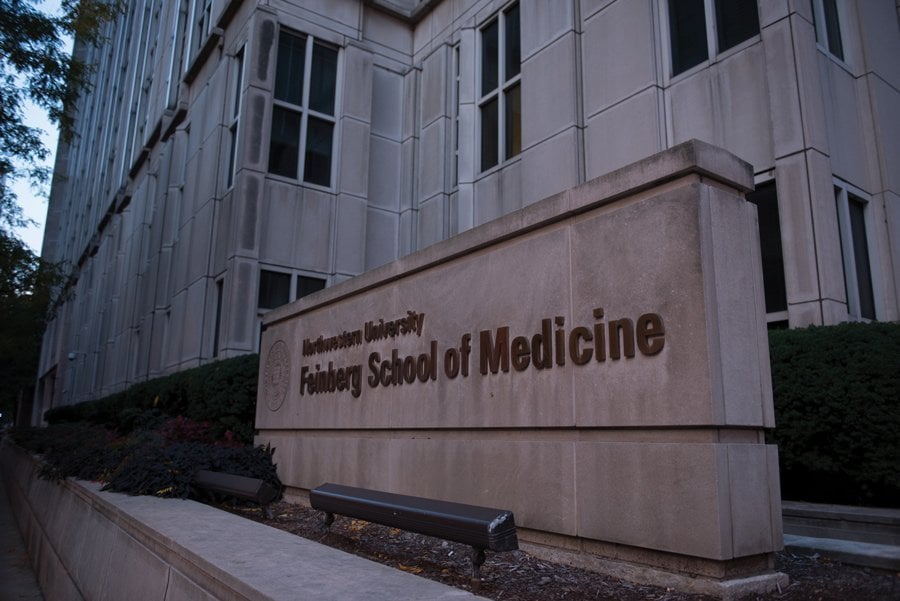Feinberg study shows physicians discriminate against people with disabilities
Daily file photo by Katie Pach
The Feinberg School of Medicine paired with other universities for a study that revealed some physicians are discriminating against people with disabilities.
October 19, 2022
The Feinberg School of Medicine recently published a study revealing physician discrimination toward people with disabilities.
The study, which was published earlier this month in Health Affairs, focused on people with intellectual disabilities, as well as disabilities related to mobility, hearing, vision and mental health. Researchers also asked broader questions regarding attitudes physicians have about people with disabilities, finding many held explicit biases against them. Feinberg produced the study in collaboration with the University of Massachusetts and Harvard Medical School.
Co-author and Feinberg Prof. Tara Lagu said she wasn’t surprised to learn some physicians deny health care to people with disabilities, but was surprised by the underlying ableist attitudes of some health care workers. Some doctors in focus groups for the study made statements about how disabled people are an “entitled population,” are “too demanding” and providing them care takes “too much time,” Lagu said.
Lagu said one of the research staff members who had to rewatch the interviews for transcription purposes struggled listening to them.
“At one point, she came to me sobbing because she was so upset that doctors were sitting in a room saying these things and I agreed with her — I was very upset,” Lagu said.
Co-author and Feinberg Research Assistant Prof. Carol Haywood said medical education perpetuates bias in medical trainees, leaving physicians inadequately prepared to provide care for people with disabilities.
Haywood was displeased by some physicians’ unwillingness to conduct standard practices with patients with disabilities — a complication that doesn’t exist between physicians and people without disabilities.
“We’ve really struggled with these results because people don’t get into medicine to deny care,” Haywood said. “These physicians, although they may reflect some ideas in broader society, they are gatekeepers to care.”
Lagu and Haywood also included questions about the Americans with Disabilities Act, a civil rights law that prohibits discrimination toward people with disabilities, during their interviews.
Most physicians in the study said they had little knowledge about the ADA, but told researchers they feared being sued, Lagu said.
Pritzker Prof. and Center for Racial and Disability Justice faculty director Jamelia Morgan previously worked with Lagu and Haywood, and has written on ADA law in the past.
Morgan said the ADA is powerful because it states denying reasonable accommodations is discriminatory. However, she said there are troubles with the law’s enforcement.
“It’s very difficult to enforce federal anti-discrimination laws nationwide and the ADA is included in that — you’re not going to catch every issue,” Morgan said. “You don’t have enough time to go after every possible incident.”
People with disabilities have to file a lawsuit, typically with qualified plaintiffs, to get justice, Morgan said. But she said lawyers are getting overwhelmed and there aren’t enough to take all the cases.
Health care-related lawsuits can also place a burden on people with disabilities. Haywood said some patients fear retaliation in the form of burdens to accessing health care when they bring complaints against physicians.
Since the release of the study, Haywood said many people felt validated by the findings and reached out to the authors about experiences they have faced.
“That’s something I’ve never experienced with publishing research before, having people so moved by what they see in the findings that their patient experiences have been reflected within what we’re describing among these physician attitudes,” Haywood said.
Haywood and Lagu said the research can be used to find solutions to the problem.
While there is minimal research in the field, Lagu said NU provided her with the opportunity to investigate further.
“I do think that Northwestern understands that this is a problem and wants to fix it,” Lagu said. “And I have seen a willingness and an interest from senior leaders at Northwestern that I have not seen in other places.”
Email: ericaschmitt2025@u.northwestern.edu
Twitter: @eschmitt318
Related Stories:
— Disability justice activists demand more accessible emergency transportation in Chicago area
— Art Encounter’s Art Club offers individuals with disabilities space to share their artistic voice



